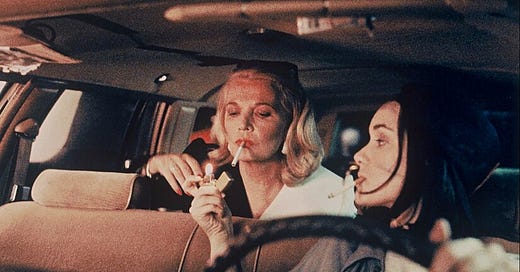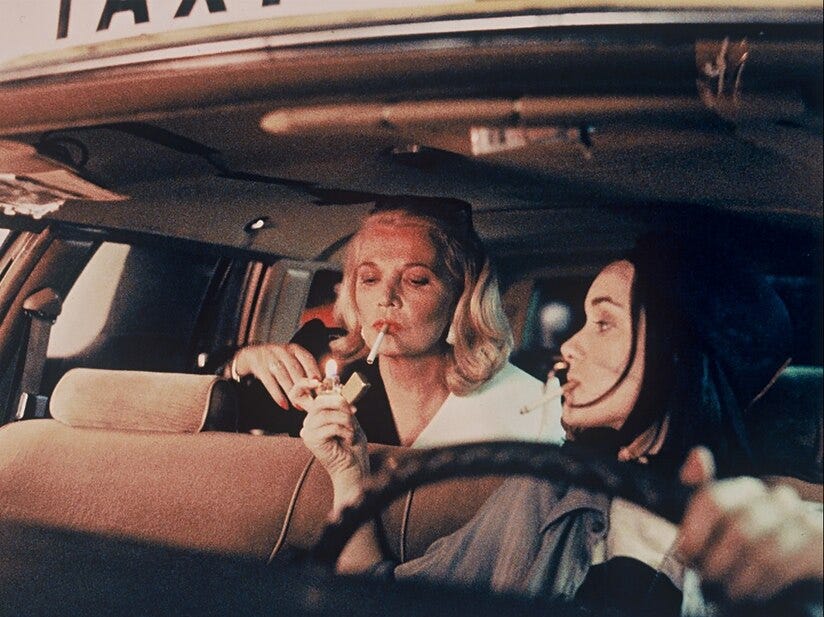◡◶▿ Home moviemakers and Hollywood titans exchange tips (hypothetically)
🚕 Introducing a new semester of filmmaking micro-essays by way of an anecdote about a taxi driver's mother. Plus: £5,000 "new ideas" fund deadline approaches.
📽️ “What you’re talking about is a hobby.”
On the snowy evening of 20th December 2010, a Manchester taxi driver named Zahid told me this about my filmmaking ambitions:
“What you’re talking about is a hobby. Everybody can do that these days. They can go home and film their mother eating on their camcorder.”
He was right. (This was before you could earn a six-figure income making mukbang movies for an audience of millions.) There was no sustainable professional career path to be followed, making movies the way I wanted to make them.
But Zahid was also wrong. At least in the spirit of what he said:
His idea that the technology for a universal “mother eating dinner” filmmaking movement devalued the power of the individual home movie.
Or that the only value of such a movie is to the hobbyists themselves.
Wrong!
(Zahid also told me I “should get a part-time girlfriend.” I’m not sure what he meant by that.)
🚑 Transferable techniques
No professional or amateur movement is as technically or demographically diverse as home moviemaking.
The ‘problem’ is that most home movies are seen by at most a handful of people.1 From phone camera clips to edited Super 8 reels. And their technical diversity remains unappreciated.
Technical diversity? The multitude of (non-)choices of:
apparatus,
subject matter,
cast and location,
shooting style,
post-production options, and
distribution/exhibition
(non-)chosen across the multitude of home moviemakers.
The home moviemaker is free. Most home moviemakers are free even of the awareness that they’re making home movies. Videoing a squirrel or filming the fireworks.
And so, the home moviemaker devises or defaults to improvised creative and technical methods. Often without conscious thought or self-criticality. Techniques of stunning aesthetic, emotional, and mediaphysical originality and potential.
This home moviemaker is freer even than the self-identified “amateur filmmaker.” The club member or keen part-timer. Home moviemaking may be a subset of amateur filmmaking, but the home moviemaker is not beholden to the rules and expectations that burden the broader amateur. Burden the hobbyist or ‘professional amateur’ from outside and from within.
And yet, the home moviemaker and the career amateur or pro have a lot to learn from each other. The home moviemaker and the Hollywood titan should spend more time on each other’s sets!
We covered “broader” amateur filmmaking in summer term 2023, touching on the home movie in AMAT10 | Home - a useful primer for the forthcoming term, if you missed it.
🍴 What’s for tea
Naturally, you’re wondering what Zahid’s dining mother movie might look like. Particularly because this was his “go-to” genre when imagining the state of filmmaking today.
How would he film it?
What would she eat?
What would we feel?
Each of these questions is ripe for unpacking into sub-questions. And to some degree, that is what we will study this term at UPV. Not Zahid’s home movie - but yours:
What techniques has the home moviemaker invented that other filmmakers have ignored?
What forms and genres might the home moviemaker’s movies occupy?
What role can the metaphysics and mediaphysics of the home movie play in our non-home filmmaking practice and our daily lives?
The underlying assumption is that anything you learn about the power of the home movie is transferable - with imagination and ambition - to experimental, indie, industrial, or Hollywood filmmaking.
Or to your next home movie.
🥧 Your movie’s dropping-off point
“Even if you made a masterpiece that everyone wanted to see, what would happen?” asked Zahid.
He answered himself: “It would be put on a shelf.
“It doesn’t last. Even proper films go out in the cinema, then DVD, Blu-Ray and Sky, then ITV, and then they are left behind.”
Well, Zahid. What about how Chantal Akerman transcribed her mother’s eating style onto the character of Jeanne Dielman. How, decades later, this movie was declared “the greatest of all time,” and a new generation of cinephiles watched it at 1.75x speed while making their own dinner?
Admittedly, Jeanne Dielman, 23, quai du commerce, 1080 Bruxelles has not yet been broadcast on ITV. But it has not been left behind.
Beginning next week, we’ll discover that:
It doesn’t matter if your movie is a masterpiece or even leaves your phone.
The humility, intimacy, and innocence of the home movie process and materials will live on in the flesh and the spirit of all who they touch.
- no matter what the critics say. No matter how your movie is archived.
We’ll look at some home movies. And some home-adjacent movies from the world’s best lesser-known filmmakers: movies that don’t strictly fit the UPV definition of “home movies” but which catch enough loose strands of the genre to offer something back.
The home movie learning from the blockbuster; the blockbuster destabilised by the home movie.
The thin line from auntie to David Fincher
I hope that Zahid is thriving somewhere today, the manager of a company, “like Richard Branson.”
Although, even if he’s become a millionaire, what will happen? His money will end up on a shelf, in a bank, investments, “left behind.” He’ll hire staff, hold meetings, build buildings, launch products and services, speak from the occasional after-dinner podium.
I hope that on his way home, he’ll tap on the glass, ask the pilot of his helicopter to re-route towards Manchester. Go visit his mum with some fancy leftovers. Dig his childhood camcorder out of the attic while the food rotates in the microwave.
Zahid, if you’re reading, I hope the next few weeks of Unfound Peoples Videotechnic micro-essays will be helpful for you.
And for the casual, amateur, indie, pro, and experimental filmmakers among all of you, eternal students. And all of your portrait-mode-phone-toting aunts and uncles. And especially you, David Fincher!
For those who choose to pay for UPV - my infinite thanks! - I’ll unpause the payment cycle next Monday. This shouldn’t charge you, since we’ve been on a break - it just means your yearlong subscription will start edging towards renewal again. (No offence taken if you choose not to renew!)
Class dismissed,
~Graeme Cole.
(Principal)
P.S. Film and Video Umbrella (FVU) New Takes £5,000 deadline
The deadline to apply for a £5,000 fee/budget from FVU for early career UK-based artists to “test new ideas and thinking in moving image” is next Monday! Good luck with that. £5,000 is plenty!
📹 Unfound Peoples Videotechnic | Cloud-based filmmaking thought. ☁️
🐦 Twitter | ⏰ TikTok | 📸 Instagram | 😐 Facebook | 🎞️ Letterboxd | 🌐 unfound.video
We can assume that the majority of phone clips don’t even reach an audience beyond the filmmaker herself.







